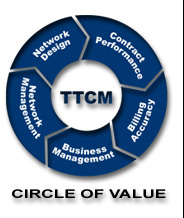




TTCM Savings Area:
Telecom Auditing
Published In: Volume
3 Issue 1
Date: May,
2004
|
Every long distance user in America has been paying 3% as Federal Excise Tax since 1898 when the "temporary" tax was first imposed to pay for the Spanish-American War. Although the war has long since faded to a distant memory, this tax has not. For a company spending $1M per year on LD, that is a tidy $30,000 annually. The total tax for all LD invoices is almost $2 billion annually! But what if that tax wasn't valid? And what if you could collect years of refunds? How large a recovery would that be for your company? The tax code states that toll telephone service is a telephonic quality communication for which there is a toll charge that "varies in amount with the distance and elapsed transmission time" of each individual communication. Today, most service providers charge a flat per-minute rate for calls rather than a rate that varies with the distance of the call. This raised the question of whether the typical long-distance service is properly subject to tax. According to a ruling by the U. S District Court for the Northern District of Ohio, the tax is not valid. That ruling came in the wake of a suit brought by OfficeMax, which stands to receive $400,000+ in credits. And a KPMG report indicates that some claimants have already recovered at least a portion of the tax through settlements with the IRS Office of Appeals. However, according to the U.S. District Court for the Southern District of Florida, in a case involving American Bankers Insurance, the court ruled that Congress's "intent" was to charge excise tax on all LD, and that the change from distance based tolls to flat charges across the US was not in and if itself cause to waive the tax.
At this point, nobody can be sure how this case will shake out. With the amount of money at stake the battle will be furious, and it could wind up in a class action suit. But we do know that the only way to get a refund is to file a protective claim, so as to put a stake in the ground. Since there is a three year statute of limitations on recovering tax overpayments, the date that you file will establish the earliest possible date for calculating your refund. Every day that passes allows previous overpayments to slip away. TelAssess believes that companies should never pay more than their rightful share for telecom, and that their rightful share should be minimized to the greatest extent possible.
©2004,
TelAssess, Inc. All rights reserved. |
![]()
©2004, TelAssess 800.657.1595
Designed by Stylus
Designs
